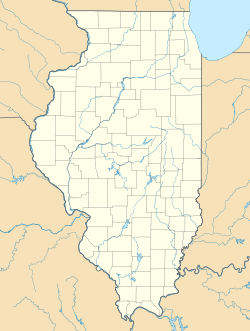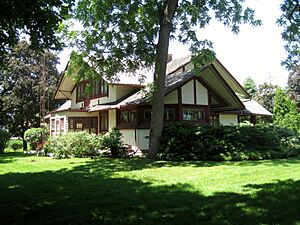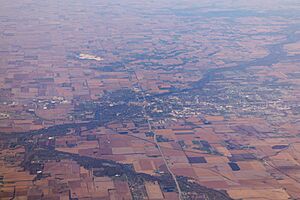Kankakee, Illinois facts for kids
Quick facts for kids
Kankakee
|
||
|---|---|---|
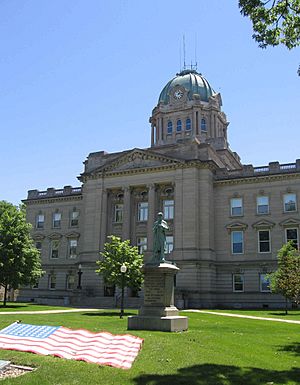
|
||
|
||
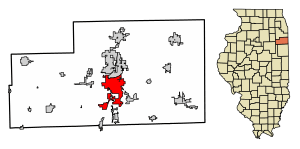
Location of Kankakee in Illinois
|
||
| Country | United States | |
| State | Illinois | |
| County | Kankakee | |
| Established | 1853 | |
| Incorporated (city) | 1865 | |
| Government | ||
| • Type | Mayor–council | |
| Area | ||
| • Total | 15.62 sq mi (40.44 km2) | |
| • Land | 15.14 sq mi (39.20 km2) | |
| • Water | 0.48 sq mi (1.24 km2) | |
| Elevation | 617 ft (188 m) | |
| Population
(2020)
|
||
| • Total | 24,052 | |
| • Density | 1,588.95/sq mi (613.51/km2) | |
| Demonym(s) | Kankakeean | |
| Time zone | UTC−6 (CST) | |
| • Summer (DST) | UTC−5 (CDT) | |
| ZIP Code |
60901
|
|
| Area codes | 815, 779 | |
| FIPS code | 17-38934 | |
| GNIS feature ID | 2395489 | |
Kankakee (/ˌkæŋkəˈkiː/ kang-KƏ-kee) is a city in and the county seat of Kankakee County, Illinois, United States. Located on the Kankakee River, as of 2020, the city's population was 24,052. Kankakee is a principal city of the Kankakee-Bourbonnais-Bradley Metropolitan Statistical Area. It serves as an anchor city in the rural plains outside Chicago.
Contents
History
The city's name is probably derived from a corrupted version of the Miami-Illinois word teeyaahkiki, meaning "open country/exposed land/land in open/land exposed to view", in reference to the area's prior status as a marsh. Kankakee was founded in 1854.
Geography
According to the 2010 census, Kankakee has a total area of 14.62 square miles (37.87 km2), of which 14.14 square miles (36.62 km2) (or 96.72%) is land and 0.48 square miles (1.24 km2) (or 3.28%) is water.
The Kankakee River runs through Kankakee. It is approximately 133 miles long and serves as a major attraction and defining landmark of Kankakee. The river water is refined at the Kankakee Water Company, and electricity is generated at the Kankakee River Dam, providing vital resources to the community. Its winding path, including inlets and eddies, creates desirable fishing conditions for outdoor enthusiasts.
Climate
| Climate data for Kankakee, Illinois (1991–2020 normals, extremes 1887–present) | |||||||||||||
|---|---|---|---|---|---|---|---|---|---|---|---|---|---|
| Month | Jan | Feb | Mar | Apr | May | Jun | Jul | Aug | Sep | Oct | Nov | Dec | Year |
| Record high °F (°C) | 66 (19) |
74 (23) |
85 (29) |
91 (33) |
99 (37) |
103 (39) |
103 (39) |
107 (42) |
99 (37) |
90 (32) |
79 (26) |
71 (22) |
107 (42) |
| Mean daily maximum °F (°C) | 32.5 (0.3) |
36.8 (2.7) |
48.6 (9.2) |
61.2 (16.2) |
72.5 (22.5) |
81.9 (27.7) |
84.8 (29.3) |
83.2 (28.4) |
77.9 (25.5) |
65.1 (18.4) |
49.9 (9.9) |
37.8 (3.2) |
61.0 (16.1) |
| Daily mean °F (°C) | 24.4 (−4.2) |
28.2 (−2.1) |
39.0 (3.9) |
50.3 (10.2) |
61.8 (16.6) |
71.5 (21.9) |
74.8 (23.8) |
73.1 (22.8) |
66.5 (19.2) |
54.1 (12.3) |
41.0 (5.0) |
30.0 (−1.1) |
51.2 (10.7) |
| Mean daily minimum °F (°C) | 16.3 (−8.7) |
19.7 (−6.8) |
29.4 (−1.4) |
39.4 (4.1) |
51.0 (10.6) |
61.0 (16.1) |
64.8 (18.2) |
63.0 (17.2) |
55.1 (12.8) |
43.1 (6.2) |
32.1 (0.1) |
22.1 (−5.5) |
41.4 (5.2) |
| Record low °F (°C) | −29 (−34) |
−21 (−29) |
−7 (−22) |
8 (−13) |
27 (−3) |
38 (3) |
46 (8) |
39 (4) |
30 (−1) |
18 (−8) |
1 (−17) |
−26 (−32) |
−29 (−34) |
| Average precipitation inches (mm) | 2.37 (60) |
1.94 (49) |
2.49 (63) |
3.87 (98) |
5.15 (131) |
5.21 (132) |
4.65 (118) |
3.85 (98) |
3.56 (90) |
3.40 (86) |
2.82 (72) |
2.35 (60) |
41.66 (1,058) |
| Average snowfall inches (cm) | 8.1 (21) |
3.4 (8.6) |
3.0 (7.6) |
0.3 (0.76) |
0.0 (0.0) |
0.0 (0.0) |
0.0 (0.0) |
0.0 (0.0) |
0.0 (0.0) |
0.0 (0.0) |
0.6 (1.5) |
5.3 (13) |
20.7 (53) |
| Average precipitation days (≥ 0.01 in) | 10.7 | 8.6 | 9.1 | 10.9 | 11.7 | 10.1 | 8.6 | 8.6 | 7.6 | 9.2 | 9.0 | 9.0 | 113.1 |
| Average snowy days (≥ 0.1 in) | 5.6 | 4.2 | 1.9 | 0.4 | 0.0 | 0.0 | 0.0 | 0.0 | 0.0 | 0.0 | 0.7 | 3.5 | 16.3 |
| Source: NOAA | |||||||||||||
Demographics
| Historical population | |||
|---|---|---|---|
| Census | Pop. | %± | |
| 1880 | 5,651 | — | |
| 1890 | 9,025 | 59.7% | |
| 1900 | 13,595 | 50.6% | |
| 1910 | 13,986 | 2.9% | |
| 1920 | 16,753 | 19.8% | |
| 1930 | 20,620 | 23.1% | |
| 1940 | 22,241 | 7.9% | |
| 1950 | 25,856 | 16.3% | |
| 1960 | 27,666 | 7.0% | |
| 1970 | 27,575 | −0.3% | |
| 1980 | 29,633 | 7.5% | |
| 1990 | 30,944 | 4.4% | |
| 2000 | 27,491 | −11.2% | |
| 2010 | 27,537 | 0.2% | |
| 2020 | 24,052 | −12.7% | |
| U.S. Decennial Census 2010 2020 |
|||
2020 census
| Race / ethnicity (NH = non-Hispanic) | Pop 2000 | Pop. 2010 | Pop. 2020 | % 2000 | % 2010 | % 2020 |
|---|---|---|---|---|---|---|
| White alone (NH) | 13,130 | 10,432 | 8,096 | 47.76% | 37.88% | 33.66% |
| Black or African American alone (NH) | 11,216 | 11,128 | 9,233 | 40.80% | 40.41% | 38.39% |
| Native American or Alaska Native alone (NH) | 58 | 54 | 62 | 0.21% | 0.20% | 0.26% |
| Asian alone (NH) | 86 | 175 | 116 | 0.31% | 0.64% | 0.48% |
| Pacific Islander alone (NH) | 7 | 3 | 3 | 0.03% | 0.01% | 0.01% |
| Other race alone (NH) | 49 | 39 | 107 | 0.18% | 0.14% | 0.44% |
| Mixed race or multiracial (NH) | 401 | 599 | 916 | 1.46% | 2.18% | 3.81% |
| Hispanic or Latino (any race) | 2,544 | 5,107 | 5,519 | 9.25% | 18.55% | 22.95% |
| Total | 27,491 | 27,537 | 24,052 | 100.00% | 100.00% | 100.00% |
Arts and culture
Library service is provided by the Kankakee Public Library.
Architecture
- Frank Lloyd Wright designed two houses in the Riverview section of the city, located on South Harrison Avenue. The B. Harley Bradley House and the Warren Hickox House both still stand today.
- The current Kankakee courthouse was built from 1909 to 1912 in the Neo-classical Revivalist style in the wake of the 1893 Columbian Exposition (the Chicago World's Fair) as part of the City Beautiful movement. The architect was Zachary Taylor Davis, who had previously worked with Frank Lloyd Wright when both were draftsmen for Louis Sullivan.
Parks and recreation
Kankakee Valley Park District
Kankakee Valley Park District has 37 parks, comprising a total of 600 acres (2.4 km2). Facilities include an indoor ice skating rink, a recreation center, dog park, campground and a 72 boat slip marina on the Kankakee River. Fishing is plentiful as the district has 13 riverfront parks as well as a 5-acre (2.0 ha) stocked quarry.
The city has two softball complexes that have both been inducted into the Softball Hall of Fame. They host annual state and international tournaments drawing nearly 50,000 spectators throughout the year. Some Kankakee youth baseball leagues have won state championships.
Education
Higher education
Organized in 1966 by a group of citizens, Kankakee Community College was established to provide a post-secondary educational resource for the people of the Kankakee area.
Primary and secondary education
Public schools are part of the Kankakee School District 111, which includes five elementary schools (Edison, Mark Twain, Lincoln Cultural Center Montessori, Steuben, and Taft), two middle schools (Kennedy and King), one junior high school (Kankakee Junior High), and one high school (Kankakee High), which from 1966 to 1983 was two separate high schools, Eastridge and Westview.
There are three private high schools: Bishop McNamara Catholic School (Catholic), Grace Christian Academy (non-denominational), and Kankakee Trinity Academy (inter-denominational).
Infrastructure
Transportation
Airport
Kankakee is served by the Greater Kankakee Airport, a general aviation facility located in the southern portion of Kankakee.
Railroads
Amtrak provides service to Kankakee from the Kankakee Amtrak Station. Amtrak operates the City of New Orleans, the Illini, and the Saluki, which each run once daily in both directions.
Highways
Interstate 57 runs east–west in the southern part of the city and turns north–south in the eastern part of Kankakee. United States Highways US 45 and US 52 run concurrently forming, along with Illinois Route IL 50, the major north–south thoroughfares through Kankakee. Illinois Route IL 17 is the major east–west road that bisects the city.
Public transportation
The River Valley Metro Mass Transit District (RVMMTD; River Valley Metro or METRO, for short) operates the region's transit bus system. Service runs seven days a week to locations in Kankakee as well as the nearby cities of Aroma Park, Bradley, Bourbonnais, and Manteno. All of the Kankakee routes are stationed out of the Chestnut & North Schuyler Transfer Station. River Valley Metro operates 12 fixed-regular bus routes and two commuter routes. The Midway and University Park commuter routes were added January 5, 2014, and in August 2015 River Valley Metro added a second Midway route to its schedule. In January 2016, a second University Park route was added.
See also
 In Spanish: Kankakee (Illinois) para niños
In Spanish: Kankakee (Illinois) para niños



